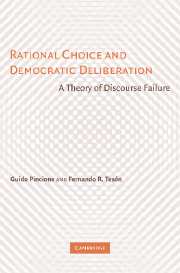Book contents
- Frontmatter
- Contents
- Preface
- Acknowledgments
- 1 Introduction
- 2 The Epistemic Argument for Deliberation
- 3 The Rational Choice Framework
- 4 The Resilience of Discourse Failure
- 5 Symbolism in Political Argument
- 6 Discourse Failure and Political Morality
- 7 Non-Epistemic Defenses of Deliberation
- 8 Deliberation, Consent, and Majority Rule
- 9 Overcoming Discourse Failure: Voluntary Communities
- Index
3 - The Rational Choice Framework
Published online by Cambridge University Press: 05 May 2010
- Frontmatter
- Contents
- Preface
- Acknowledgments
- 1 Introduction
- 2 The Epistemic Argument for Deliberation
- 3 The Rational Choice Framework
- 4 The Resilience of Discourse Failure
- 5 Symbolism in Political Argument
- 6 Discourse Failure and Political Morality
- 7 Non-Epistemic Defenses of Deliberation
- 8 Deliberation, Consent, and Majority Rule
- 9 Overcoming Discourse Failure: Voluntary Communities
- Index
Summary
Instrumental and Epistemic Rationality
The theorist of deliberative democracy may point out that we have wrongly assumed an instrumental conception of rationality. A proper epistemic defense of deliberative democracy requires instead, he might claim, a specifically deliberative conception of rationality. Citizens who deliberate are not necessarily, or solely, attempting to pursue their self-interest in the sense presupposed by the instrumental view. Rather, deliberative rationality is an application in deliberative settings of rules of epistemic rationality. Thus, sincere people who have beliefs based on sensory perceptions under normal conditions and use valid rules of inference will assert those beliefs in deliberation, when relevant. The kind of deliberative rationality involved here is, according to the objection we are imagining, intractable in instrumental terms. Deliberative rationality is moored to epistemic rationality, which has an inner logic, or objectivity, that need not be aligned with our goals – think of unpalatable truths that we nevertheless believe. The suggested conclusion is that the instrumental model of rationality cannot capture behavior governed by the rules of epistemic rationality. Epistemic rules are irreducible to means–ends recipes or to cost–benefit analysis. Those rules best explain and predict deliberative behavior, especially in well-designed deliberative settings, where the objective force of arguments holds sway. On this view, then, we should abandon the rational choice assumption we've used so far to explain and predict discursive political behavior. To understand deliberative practices, we should instead use an epistemic conception of rationality.
- Type
- Chapter
- Information
- Rational Choice and Democratic DeliberationA Theory of Discourse Failure, pp. 65 - 86Publisher: Cambridge University PressPrint publication year: 2006



